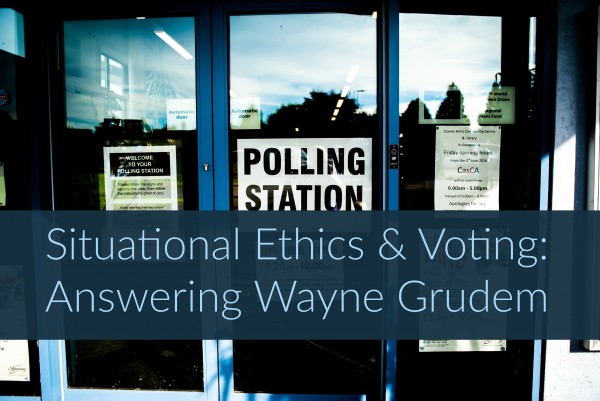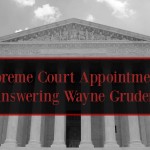
If I had a dollar for every time this year that I have encountered the phrase “lesser of two evils,” I would be as rich as Donald Trump claims to be. Few evangelical Christians advocate the election of Donald Trump directly—rather, it is on the basis of the claim that Trump, though seriously flawed, is better than Hillary Clinton. He is the lesser of two evils, they say.
Does the lesser-of-two evils kind of thinking come from a biblical worldview? Well, according to the highly regarded theologian, Wayne Grudem, yes indeed. The crux of Grudem’s oft-circulated article lies in the following assertion:
I do not think that voting for Donald Trump is a morally evil choice because there is nothing morally wrong with voting for a flawed candidate if you think he will do more good for the nation than his opponent. In fact, it is the morally right thing to do.
Grudem, who is highly respected, is making a moral argument that is being used to encourage Bible-believing Christians to vote for Trump. This article is aimed at the same audience. Neither Grudem nor I would ever think of imposing scriptural precepts on voters in general. This is a debate for those who voluntarily want to follow the Word of God.
You may note the lack of any reference to any passage from the Word of God supporting Grudem’s central claim. A full reading of his piece reveals that he never attempts to prove his central thesis from Scripture. In the entire article, Grudem directly cites only three passages of Scripture.
- I Peter 1:1 is cited for the idea that we are “exiles” on earth.
- This is immediately followed by a citation of Jeremiah 29:7, which says that we are to “seek the welfare of the city where I have sent you into exile.”
- Finally, Grudem warns against indifference by citing Obadiah 1:11, which condemns those who stand “aloof” on the day that invaders entered the city of Jerusalem.
Grudem’s reading of these verses is non-controversial, but they lack any relevance to his central contention: that in choosing a leader of a nation, we should accept the lesser of two evils—even when both major choices are seriously flawed. Moreover, it is quite telling that Grudem fails to cite even one passage of Scripture in his discussion of the question of whether character matters in the selection of a leader.
It is ironic that Grudem is a theologian and yet he spends the vast majority of his time discussing ramifications of the election on the Supreme Court of the United States; whereas, I am a constitutional lawyer (having argued in the Supreme Court) and a professor of Constitutional Law (two of my former students are currently clerking for the Supreme Court) and, yet, I am going to spend the bulk of my time discussing the teaching of Scripture. (I will follow up with another article to dissect Grudem’s analysis of the Supreme Court issues.)
The central question that thoughtful evangelical Christians are seeking to resolve is this: what does the Bible teach about the standards for voting in a democratic republic?
This question, however, requires me to answer a preliminary question: can we find guidance for voting in the Bible? I assert that we can. I will admit that it is not an easy question and that our study requires diligence, because Scripture does not contain a straight-forward passage that directly answers the question.
But, the sufficiency of Scripture to provide answers for every issue in life is quite clear. Psalm 19 declares, in majestic poetry, the all-encompassing power of the Word in our lives. Do we need to have understanding of a difficult and dark situation? “The commands of the Lord are radiant, giving light to the eyes.” Psalm 19:8. Moreover, 2 Timothy 3:16-17 proclaims that Scripture enables us to be “thoroughly equipped for every good work.” When Christians vote, we should aspire to do a good work, and the light we need to do so can reliably be found in Scripture.
Since voting in a democratic republic is not directly discussed in Scripture, we should first consult the passages that deal with the closest analogies possible. I would submit that the following sections should guide our discussion:
- The New Testament passages about “governors” and other civil leaders.
- Deuteronomy 17’s directives to Israel on the standards it should employ to pick a king.
- The many New Testament passages that describe the standards for choosing leaders of the church.
It is important to emphasize at the outset that I am using these passages not as direct commands or answers, but as containing guiding principles that lead us to the right answer. Those who reject anything from the Old Testament on the subject of government need to pay attention to this passage from Jeremiah 18:
7 If at any time I announce that a nation or kingdom is to be uprooted, torn down and destroyed, 8 and if that nation I warned repents of its evil, then I will relent and not inflict on it the disaster I had planned. 9 And if at another time I announce that a nation or kingdom is to be built up and planted, 10 and if it does evil in my sight and does not obey me, then I will reconsider the good I had intended to do for it.
God’s Word contains answers for every nation in every era.
Continue to find out the biblical standards for our authorities…






